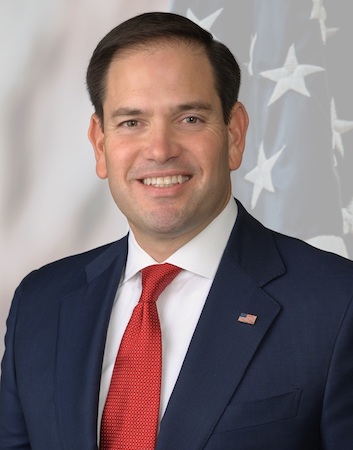The Chronicles Of Grant County
New Federal Regulatory Requirements
Affecting Businesses In Southwest New Mexico
Part Three
 Senator Marco Rubio. (The photograph was provided courtesy of the Office of Senator Marco Rubio.)
Senator Marco Rubio. (The photograph was provided courtesy of the Office of Senator Marco Rubio.)
The new regulations from the Federal government that require most businesses in southwest New Mexico – and throughout the United States – to file Beneficial Ownership Information (BOI) reports with the Financial Crimes Enforcement Network (FinCEN), a division of the U S Department of the Treasury, have been strongly supported by Senator Marco Rubio of Florida.
Senator Rubio has been nominated by President Donald Trump to serve as the United States Secretary of State in the new Administration.
It may be useful to consider previous news releases issued by Senator Rubio.
On December 11, 2020, a news release was issued by Senator Rubio entitled "Rubio Secures Provision in Defense Bill to Combat Financial Crime by Ending Anonymous Shell Companies."
Portions of that news release are as follows:
"U S Senator Marco Rubio (R-FL) secured a provision in the National Defense Authorization Act (NDAA) for Fiscal Year 2021 (H.R. 6395) conference report that passed the Senate that will help stop criminals, including sophisticated criminal organizations, from using anonymous shell corporations to engage in illicit activities like money laundering, sex trafficking, fraud, and terrorist financing…"
"Senator Rubio first introduced the bipartisan Corporate Transparency Act [CTA] with Senator Ron Wyden (D-OR) in August 2017. In August 2018, Rubio, Wyden, and Senator Sheldon Whitehouse (D-RI) succeeded in passing bipartisan legislation to lay the groundwork to expand a U S Department of the Treasury initiative to curb foreign nationals laundering money through high-end real estate…"
"Specifically, the Corporate Transparency Act will:
Generally require basic information, including name, address, date of birth, and a driver's license number or other identification of the beneficial owner be reported to the Treasury Department's Financial Crimes Enforcement Network (FinCEN) upon the creation of a company, with some exceptions. No financial information, business details, or proprietary information is required;
Ensure government authorities accessing beneficial ownership information do so only for authorized purposes;
Minimize reporting burdens for companies; and
Provide for civil and criminal penalties for willful violations of the requirements under this law."
On May 5, 2021, a news release was issued by Senator Rubio entitled "Rubio, Whitehouse, Wyden, Grassley Urge Strong Implementation of Anti-Money Laundering Reform."
Portions of that news release are as follows:
"U S Senators Marco Rubio (R-FL), Sheldon Whitehouse (D-RI), Ron Wyden (D-OR), and Chuck Grassley (R-IA) sent a bipartisan comment to the Financial Crimes Enforcement Network (FinCEN) encouraging the efficient, effective implementation of a beneficial ownership reporting system, as required by the Corporate Transparency Act (CTA). Rubio secured the anti-money laundering and beneficial ownership provisions, modeled after the CTA, in the FY21 National Defense Authorization Act (P.L. 116-283)."
"'[T]he CTA is the product of a sensitive and painstaking legislative process, and its passage represents perhaps the most important anti-money laundering reform of the past decade,'" the senators wrote. "'Despite the legislative success, this achievement can only be realized if the system works in practice. As such, we encourage FinCEN to implement a straightforward, efficient, and effective system and to do so promptly.'"
A portion of the letter sent by the Senators referenced in this news release is as follows:
"The passage of the CTA marked the culmination of a years-long effort in Congress to combat money laundering, international corruption, and kleptocracy by requiring certain companies to disclose their beneficial owners to law enforcement, national security officials, and financial institutions with customer due diligence obligations. During that time, Congress held numerous hearings across a host of committees, sought input from key stakeholders, worked with officials from both the Obama and Trump administrations, and considered multiple pieces of related legislation and models from other nations."
"In crafting the CTA, Congress negotiated many complex policy issues, including what information would be reported, how that information would be collected, and who would have access to it. We and other drafters of this law sought to strike the proper balance between collecting accurate and useful information and not overburdening businesses with compliance obligations. In the end, the CTA also received strong support from a vast and diverse stakeholder coalition, including law enforcement, national security experts, the business community, the real estate community, the financial sector, and non-governmental organizations."
"In light of the broad support for the CTA, we urge FinCEN to take all steps to ensure that the beneficial collection system reflects Congress's intent that the system produce high-quality data and that authorized users have timely access to that data. To achieve this, FinCEN should be mindful not to leave loopholes that could dilute the quality of the information collected or allow bad actors to evade reporting. Additionally, the information is only useful if authorized users are able to efficiently access the data. As such, FinCEN should ensure that authorized users, including law enforcement and national security officials, and financial institutions with customer consent, have early, timely, and full access to beneficial ownership information. The access procedures should build on existing protocols and those provided for in the legislation and should avoid creating redundant hurdles that would unnecessarily delay access."
"In short, the CTA is the product of a sensitive and painstaking legislative process, and its passage represents perhaps the most important anti-money laundering reform of the past decade. Despite the legislative success, this achievement can only be realized if the system works in practice. As such, we encourage FinCEN to implement a straightforward, efficient, and effective system and to do so promptly."
On May 10, 2022, a news release was issued by Senator Rubio entitled "Rubio, Colleagues Urge Treasury to Fully Implement Corporate Transparency Act."
Portions of that news release are as follows:
"U S Senators Marco Rubio (R-FL) and Elizabeth Warren (D-MA) sent a letter to U S Treasury Secretary Janet Yellen and Acting Director of the Financial Crimes Enforcement Network (FinCEN) Himamauli Das regarding the delayed implementation of Rubio's Corporate Transparency Act (CTA), which was signed into law in 2020 (P.L. 116-283)."
"'The Treasury Department has yet to finalize the implementation of the CTA – or even set a timetable for its completion,' the senators wrote. 'In various hearings last month, both of you could only commit to proposing the second CTA rule by the end of 'this year.' These delays run contrary to the clear instructions of Congress, undermine American efforts to respond to Russia's war against Ukraine, and hinder broader efforts to protect the U S financial system against the threat of illicit finance.'"
"Senators Chuck Grassley (R-IA), Sheldon Whitehouse (D-RI), Ron Wyden (D-OR), Bob Menendez (D-NJ), and Bill Cassidy (R-LA) also signed the letter."
As you read these news releases, please keep in mind that among the information required to be filed by most businesses – with some exceptions – include the name, date of birth, and street address of each beneficial owner. In addition, an identification document of each beneficial owner must be uploaded to the BOI filing system.
Please keep in mind that while filing a BOI report is not an annual requirement, reporting companies do have to file BOI reports as any information needs to be updated or corrected. Those updated BOI reports must be filed within 30 days of any change.
Please keep in mind that individuals and reporting companies required to file, but that don't do so face several potential sanctions. These include civil penalties of up to $500 for each day that the violation continues as well as criminal penalties of up to two years imprisonment and fines of up to $10,000.
Please keep in mind that the information filed with the FinCEN will be available to a variety of governmental and financial entities in the U S and beyond.
Please keep in mind that according to a fact sheet from the Federal government, information from the FinCEN can be utilized, for "…both criminal and civil investigations and actions, such as actions to impose civil penalties, civil forfeiture actions, and civil enforcement through administrative proceedings."
Please keep in mind that the official biography of Senator Marco Rubio states that "…he's developed a reputation for working across the aisle to pass common-sense reforms that strengthen our economy, communities, and families."
Please keep in mind that the legislation that authorized these new Federal regulations was vetoed by President Trump in December of 2020. The legislation became law, though, because both the U S House of Representatives and the U S Senate voted to override the veto by President Trump.
Of the 94 U S Senators that voted on this override matter, 81 voted to override the veto; 13 voted not to override the veto. Six U S Senators did not vote on the matter. Senator Rubio was one of the 81 U S Senators that voted to override the veto of President Trump.
Of the 409 members of the U S House of Representatives that voted on this override matter, 322 voted to override the veto; 87 voted not to override the veto. Twenty-one members of the U S House of Representatives did not vote on the matter.
Do you have questions about communities in Grant County?
A street name? A building?
Your questions may be used in a future news column.
Contact Richard McDonough at
If your email does not go through, please contact
© 2024 Richard McDonough











